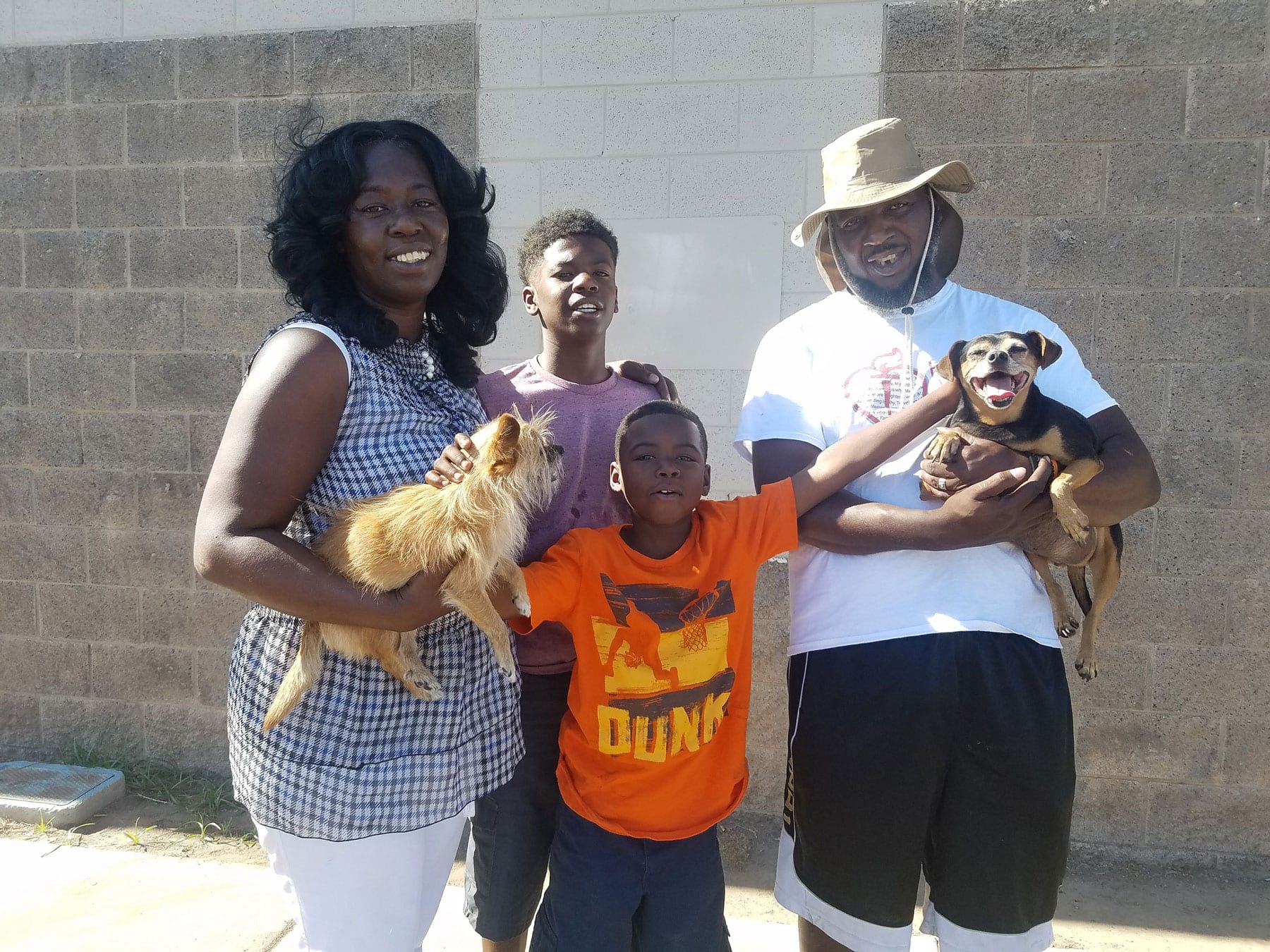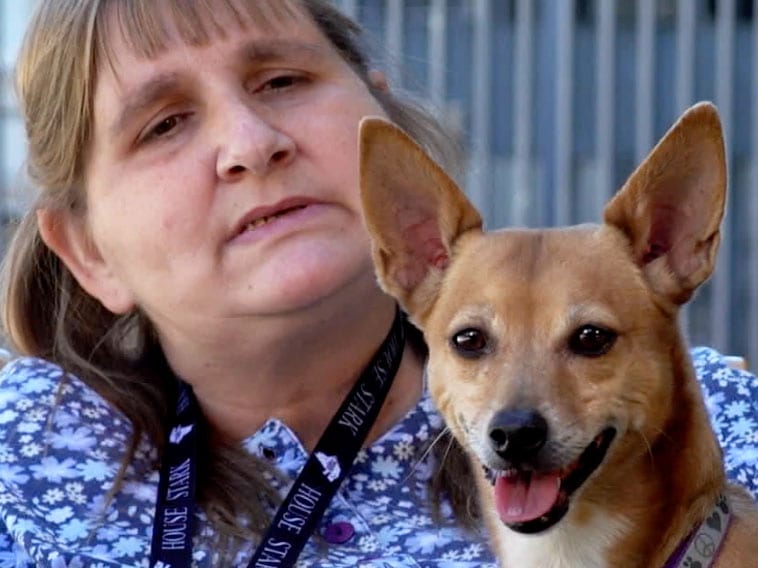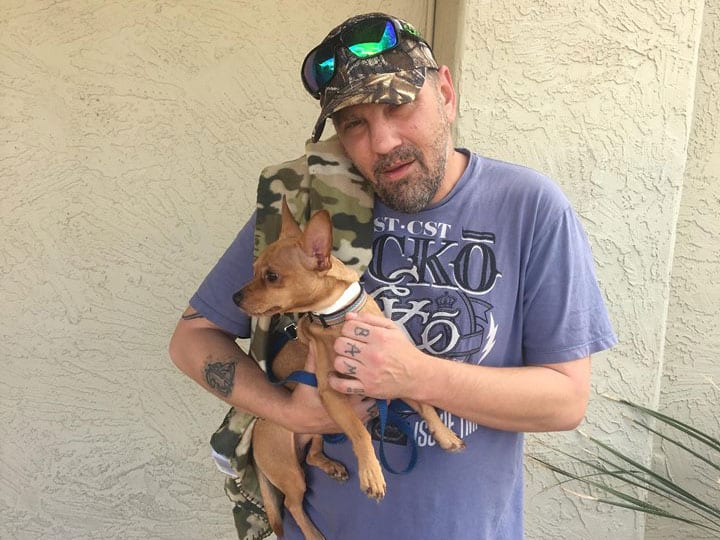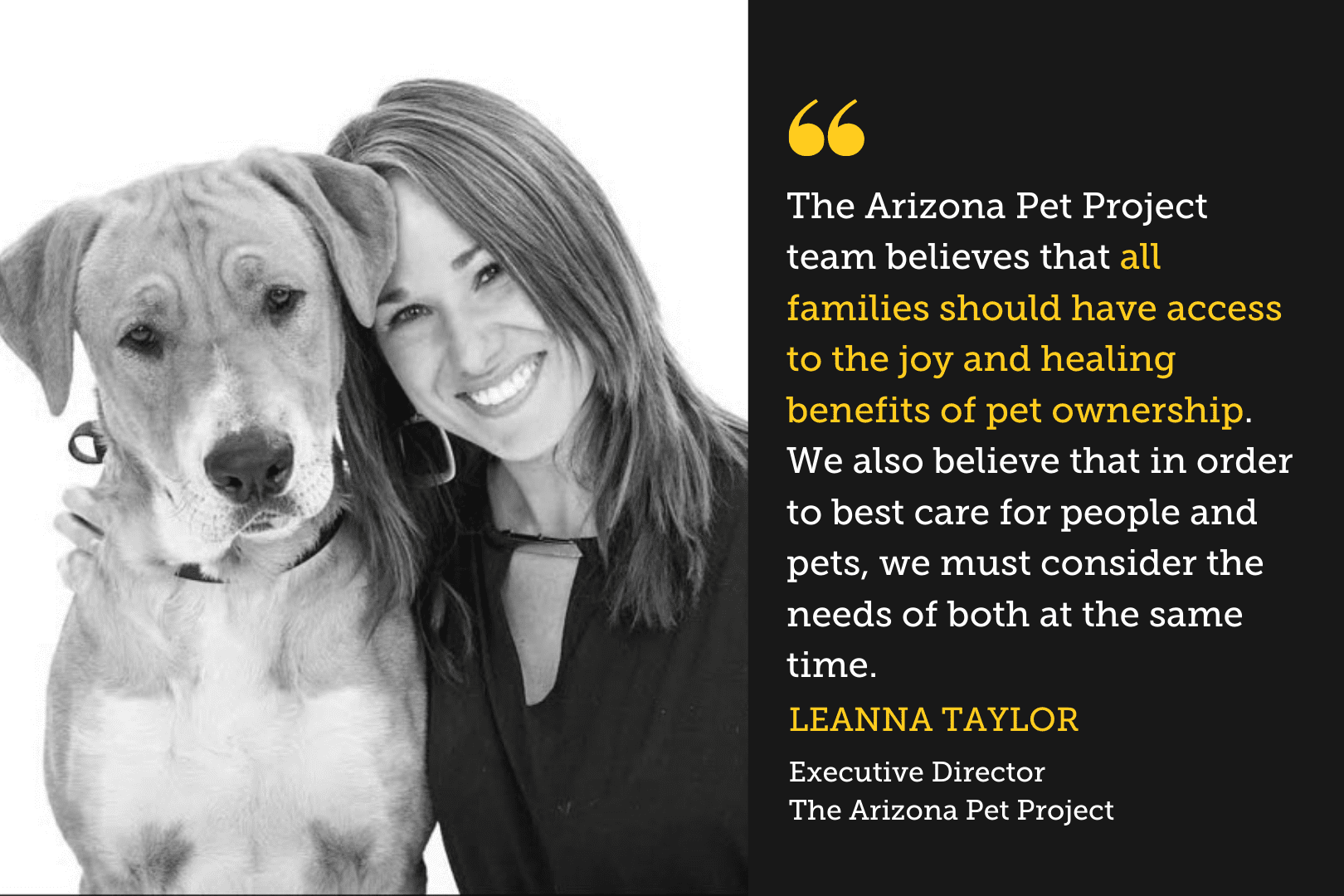About the author: Leanna Taylor is the executive director of The Arizona Pet Project, a nonprofit dedicated to keeping pets with their people. From financial assistance to pet-friendly housing, The Arizona Pet Project connects vulnerable community members and families in crisis with individualized services and resources, preventing the unnecessary surrender of their companions.

Latoya (left) along with her husband, and two children hold their two dogs. They chose not to enter a shelter or housing situation that would separate them from their pets. (Photo: The Arizona Pet Project)
It’s a myth that people experiencing homelessness cannot care for a pet
When you drive by an unsheltered person with a pet, what crosses your mind? If you’re like many of the people I’ve interacted with over the past eight years in my role with The Arizona Pet Project, it’s “oh, that poor dog,” or “if they can’t afford a roof over their head, they shouldn’t have a pet.” Strangely, these are often the same people who tell me they would rather be homeless than give up their pet.
When I drive by an unsheltered person with a pet I think, “what a lucky dog” and “I’m so glad that person has the unconditional love of their pet.” You see, the one thing a dog wants more than anything in the world (yes, even more than food) is their person. And the one thing we as people want more than anything is someone who looks at us and sees the world.
What heaven it must be to have your best friend “home” with you all day, everyday. No dog would trade air conditioning, a luxury bed, or designer pet food for the constant companionship of their human family. For pets who live with the housed and employed, the worst part of their day is when we leave for work — making them the only ones sad the world is returning to a pre-COVID “normal.”

Karena is a domestic-violence survivor and senior citizen who lives with a metal rod in her back. She was evicted from her home, and was living at a bus stop with her five dogs and cats. (Photo: The Arizona Pet Project)
Companion animals provide emotional support and essential, loving relationships
It’s also true that people experiencing homelessness make sure their beloved pets’ needs are cared for before their own. In every study conducted on unsheltered people with pets, the data is clear — the pet’s needs are placed ahead of the person including food, medical attention, and safeguards against extreme weather.
The benefits of pet ownership for those without housing are also clear. They provide a sense of purpose, unconditional love and belonging, increased safety, mental and physical health benefits, and a reduction in substance abuse.
After celebrating their special relationship, my thoughts go to the impact housing and sheltering policies have on our pet-owning families.
I think of Brian, a veteran with PTSD, who was in such a dark place he contemplated suicide daily — until he met a homeless dog he named Axel, and found his will to live. Not wanting Axel to suffer an Arizona summer on the streets, he sought out transitional housing and got it. But couldn’t bring his dog, so he refused, and together they remained homeless.

A veteran with PTSD, Brian rescued his dog Axel from the streets, and the two are inseparable. (Photo: The Arizona Pet Project)
I think of Karena, a domestic-violence survivor, and senior who lives with a metal rod in her back. We met her living at a bus stop with her five dogs and cats after being evicted.
And I think of Latoya’s family — including her husband, two children, and their two dogs — that we met living in their car after job and housing loss. They refused to enter a shelter and face separation.
Despite benefits to health and well-being, pet ownership can serve as a barrier to services
Did you know that 70% of American households have pets? It’s true. More households in our country have pets than have children. We call these “bonded families.” Our lives have become so inextricably intertwined with animals, it’s impossible to separate one from the other. For bonded families, any issue that impacts humans impacts pets. This includes housing insecurity, domestic violence, substance abuse, economic insecurity, racism, and mental and physical health crises.

As the homelessness and eviction crisis deepens, pet-owning families are disproportionately affected. This includes a significant percentage of seniors, single women and children. It is estimated that in Maricopa County alone, up to 5,000 families with pets per month could find themselves homeless when the eviction moratorium expires. In some cases, the pets are used as the reason for eviction. Once they lose their homes, their issues are compounded because of the animals.
Sadly, many of the social service delivery systems have not caught up to this reality. Unsheltered people with pets are unable to access many of the resources available in our community because of their pets. Rather than part with their four-legged family, they choose to sleep on the streets instead of in a safe shelter. They turn down transitional housing because they aren’t allowed, or can’t afford, to bring their pets.
The Arizona Pet Project team believes that all families should have access to the joy and healing benefits of pet ownership. We also believe that in order to best care for people and pets, we must consider the needs of both at the same time. So, the next time you drive past an unsheltered bonded family, don’t judge. Rather, advocate for programs that provide their family with the services they need.
Update: As of 2023, 66% of US households own a pet, according to the World Animal Foundation.
About this series: Led by Phoenix Community Alliance — Community Voices is a series about the impact of homelessness in Downtown Phoenix, and commonly-held myths, stereotypes and misperceptions of the issue.





